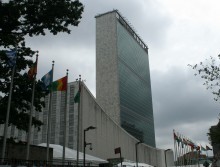 The Arab League proposal on handling the ongoing bloodshed in Syria, which includes creating a transitional government, was still being negotiated by the United Nations Security Council as of Wednesday. A vote on a UN measure on Syria is expected soon. The vicious crackdown on dissidents from Syrian President Bashar al-Assad’s regime has led to the deaths of thousands, with the Arab League and the West now working to get the UN Security Council to take substantial action.
The Arab League proposal on handling the ongoing bloodshed in Syria, which includes creating a transitional government, was still being negotiated by the United Nations Security Council as of Wednesday. A vote on a UN measure on Syria is expected soon. The vicious crackdown on dissidents from Syrian President Bashar al-Assad’s regime has led to the deaths of thousands, with the Arab League and the West now working to get the UN Security Council to take substantial action.
However, Russia and China have voiced opposition to demanding that Assad hand over power to a deputy, which is part of the Arab plan for ending the violence.
According to a summary of Tuesday’s Security Council session on Syria posted on the UN website, the Arab League proposal calls for dialogue between the regime and the opposition within two weeks, creating a unity government within two months and eventually holding internationally-monitored elections. Assad would also hand power to his vice president for the transition period.
Should the Assad government turn down the plan, the international community would respond with economic “pressure.”
In a press briefing on Wednesday, United States Ambassador to the UN Susan Rice said the power transition was “one of the more difficult issues. It’s still being worked.”
In her comments, which were released by her office, Rice said that Wednesday’s Security Council meeting was a “constructive session, conducted in a good spirit.”
“It’s way too soon in my judgment to know whether ultimately there will be agreement, but I think people are in the spirit of rolling up their sleeves and trying to get to work in a serious manner,” Rice was quoted as saying.
Russia remains concerned that a strong UN plan for Syria will pave the way for military action in the country, just as happened in Libya. In an interview with the Australian Broadcasting Corporation, Russian Foreign Minister Sergey Lavrov laid at least some blame for the lack of political progress in Syria on the opposition, which is refusing to negotiate with Assad.
According to a transcript of the interview posted on the Foreign Ministry’s website, Lavrov said of the opposition, “They say they’re not going to negotiate until he [Assad] leaves, and he is not leaving. What are you going to do? Shell him, bomb him?”
Despite that stance, Lavrov also expressed an openness to another member of Assad’s government negotiating with the opposition, raising questions if some sort of compromise can still be reached.
“If they say we want a negotiated solution they must negotiate with the representative of the current government,” Lavrov said in the Australian interview. “I don’t think that president Assad personally is going to negotiate. But there would be somebody from this regime, if they say that we can accept vice-president as the head of interim government or whatever, why don’t they sit down with him and negotiate? And then it would be a Syrian solution, not a solution imposed by outsiders.”
Rice, meanwhile, refused to commit to a timeline on a vote for the UN resolution. “I wouldn’t be wedded to one day or another. I think it’s moving at a pace that indicates seriousness… There will undoubtedly be more discussion, and then probably another round of instructions,” Rice was quoted as saying. “So I think this could—we’re not talking weeks, but we’re not talking, you know, tomorrow.”
(By Staff, www.themideastupdate.com, February 2, 2012)

1 comment for “Negotiations Continue on UN Resolution to End Syrian Violence”